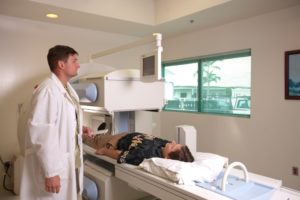 Nuclear Medicine
Nuclear Medicine
A diagnostic nuclear medicine study provides information about both the anatomy and the function of a particular gland or organ. During the procedure, our certified nuclear medicine technologist will introduce a small dose of radioactive material usually via an intravenous injection. The material temporarily emits gamma rays from the specific gland or organ. A sensor or gamma camera is placed near the patient, which detects the rays and the collected data can be converted into diagnostic images. Because the radioactive material is administered in a tiny dose and remains in the body for a relatively short time, the risk posed by nuclear medicine studies is minimal.
TREATING CONDITIONS
Nuclear medicine is also used to treat certain conditions – most commonly thyroid disorders or certain forms of cancer. Like the diagnostic studies described above, nuclear medicine treatment involves introducing small amounts of radioactive material into a particular internal organ or structure. In the case of cancer treatment, radioactive material is carefully positioned near the cancerous growth or tumor. The material emits radiation at a controlled dose, destroying nearby cancer cells while preserving surrounding tissues.
Some nuclear medicine procedures require special preparation and are performed on an outpatient basis, requiring only a few hours to complete.
PROCEDURE SIDE EFFECTS / COMPLICATIONS
There are no side effects or complications associated with having a nuclear medicine examination.
PROCEDURE FOLLOW-UP CARE
Please follow up with your primary care physician for results.
